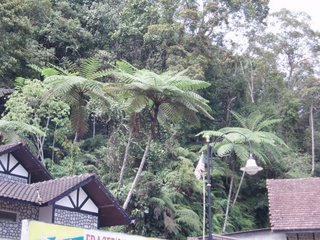此文已于2006年11月16日刊登于(This artible has been published in )《独立新闻在线》http://www.merdekareview.com/news.php?n=2970
马美自由贸易协定第三轮谈判已经结束。在10月30日早上,一百多名社会人士在“反对自由贸易联盟”的号召下,前往谈判地点抗议、示威。然而,反对自由贸易人士激昂的呐喊并没有通过媒体传遍全国各地角落。
就华文报章而言,唯有《东方日报》以彩色版进行报道,但该报又将示威人士指为“激进份子”,让人不禁怀疑,我国的新闻把关人,对马美自由贸易的谈判、签定后的影响,究竟是不闻不问?不知不觉?还是不清不楚?
一般而言,自由贸易协定指两国或以上的国家、经济体间具有法律约束力的契约,签署国的目标之一是消除贸易壁垒,促进彼此的产品与服务自由流动。此文暂不讨论多边自由贸易,但看马美自由贸易,拥护或支持的人皆各有说辞。
有人欢喜有人愁
马美自由贸易估计会让政府取消一些保护措施,一名马来政治评论人在报章上指,反对者是一些“保守政治声音”。一些华裔同胞则抱着看好戏的心理,毫不讳避地直指“让美国的竞争来纠正那些只保护单一族群的政策!”
种族政治走到这个地步,的确让人无可奈何。一方因长期浸泡在各种各样的优惠、特权中,一旦保护政策被取消,就像终日由主人喂饱的猫那样,可能连捉老鼠的本能也失去;而另一方则希望籍自由贸易来逼使政府取消保护政策,那长期“
自力更生”的心底,积累满肚子长期受制度性压制及边缘化的怨气,争的就是与其他人平起平坐,公平竞争的机会。
原本,国内各行各业包括:电子业、纺织业、服务业、医药界、农民、金融业等,举凡出卖劳力赚取生活必需品的人民,都应该质疑马美自由贸易的谈判内容。然而,反对或支持马美自由贸易的人士皆从本族群利益考量利弊,若此协定哪朝成定局,其导致的后果,这一代以种族角度思考的人士都难辞其咎。
与美自贸恶梦连连
非洲各国、泰国、印尼人民都反对他们的政府与美国签署自由贸易协定。美国是经济强国,但不代表和它进行自由贸易就能飞黄腾达。笔者对一部影片记忆犹新:加勒比海某小国因美国入口的奶粉价格低于本国生产的鲜奶(美国政府给予美国农产品极高的津贴),导致牛奶供应商必须将数加仑的牛奶倒掉、养牛人忍痛杀掉奶牛… …
经济强国与发展中国家签署自由贸易协定,是强迫小国开放市场、让资本与技术相对薄弱的本土工、农、商直接面对跨国集团的竞争。如果中小型企业、承包商倒下,失业率将随之提高,贫富悬殊问题加剧。政府放松投资管制后,大资本家在贪污腐败当道的发展中国家继续扩张、累积资本。
自由贸易考验民主
在国内,有很多关乎大众利益的文件被列为官方机密,包括政府与南北大道公司的合约。这一次,我国谈判代表自今年6月份起,皆对会谈内容三缄其口。要知道,无论自愿与否,在谈判过程中,美国政府早让我国代表签署保密协议。我们应该大声问道:“你们签署的合约关乎全国2千700万人口的命运,凭什么要我们相信你?”
谈判还没有结束,马美自由贸易对我国的影响对于全体国人而言,还没有切肤之痛。大家连国内的攫夺案、通货膨胀都应付不暇,要关注这种影响下一代的经济协定似乎显得心有余而力不足。但是,要知道,根据我国宪法,自由贸易协定可以绕过国会,直接在内阁通过。我们要问:拥有决定权的部长们,在没有咨询民意的情况,你们依据什么来决定国民的命运?
但笔者相信,人民可以要求最基本的透明度。贸工部不应该屈服于美国任何形式的协议,而应该在每一轮会谈后光明正大地举行汇报会、征询各界意见。美国代表尚且需向他们的工商界代表汇报,凭什么我国的政府能将会谈文件藏起来,不面对人民?
由经济列国如美国、日本、欧盟主导的自由贸易必须谨慎看待,因为当中涉及的问题包括:谁定义的自由、自由的条件、自由的范围等等,在搞不清楚自由贸易伙伴是敌是友的情况下签定自由贸易,我们必然会赔上追求这类自由的代价。
The third round of the Malaysia-US Free Trade Agreement talks is over. On 30 Oct 2007 morning, more than 100 activists gathered in front of the Imperial Hotel, where the talks were held, they went there to protest and demonstrate. However, their voice has not been heard by people in others part of the country.
Generally speaking, Free Trade Agreement means contract between two or more than two nations or economies that is aimed to remove protective customs tariffs, and to encourage free flow of goods and services between the parties. In this article, multilateral free trade is not in the process of discussions, we will only have the choice of facing the implications of the controversial Malaysia-US free trade.
It is believed that FTA Malaysia-US will lead to the abolishment of some protective policies in a local market. One of the Malay intellectuals wrote, people who anti-FTA are “conservative politicians”. For Chinese-Malaysians, some of them are welcoming the
It is very sad to see our racial politics moving into such direction. All kind of privileges, special rights have permeated into the life of one side. On the other side, they hope to see the abolishment of protective policies through the FTA, this is the resentment stems from the groups which have long systematically marginalized by the government, they still hope for equal opportunities after a long time of self-dependency.
Actually, people from all walk of life including electrical, textile, service, and medical industries, farmers, finance etc, ( long as these people are selling their labour in exchange for satisfaction of their basic needs) they all need to question the content of the FTA negotiations. However, various groups who support or oppose FTA are measuring the interest of their ethnic groups, therefore, if the agreement comes into effect, they have to pay the price for any consequences of the FTA negotiations.
People in
When the economically developed countries seek to sign FTA with developing countries, it means forcing developing countries to liberalize their market. Due to a lack of capital and technologies, local businesses and private sectors will find it hard to compete with transnational corporations (TNCs). If these small manufacturing enterprises, contractors collapse, unemployment rate as well as the gap between the rich and the poor will increase. When the government loosens investment regulations, the capitalists will continue to expand and accumulate their capital again in the corrupt developing countries .
Free Trade also makes a mockery of democracy. In many countries, even the elected parliamentarians are unable to overthrow the decisions taken prior to signature of FTA. Some of the governments were charged by TNCs when they were trying to regulate some laws to protect the interest of their disadvantages groups. Any government measures that affect the expected future profits of the
Many lessons can be learnt from countries like
The anti-FTA Alliance consists of NGOs and opposition parties. When they wrote to Ministry of International Trade and Industry (MITI) and asked for a talk with Rafidah, the ministry rejected them with a letter telling that they know what they are doing.
In
The FTA talks will be continued. It seems like our nations are too busy with snatching thieves, inflation, it is unlikely to draw attention of the people. Crucially, according to our constitution, the cabinet can endorse the FTA without the consent of parliament. It is crucial for us to ask our ministers, without public participation and consultation, on what ground for the ministers to decide our future?
At least, we should ask for transparency. MITI should not be bound by any kind of the
We have to scrutinize every aspects of the free trade dominated by developed countries such as the
(The fourth round of the Malaysia-US FTA talks will be held at 8-12 Jan 2007)







